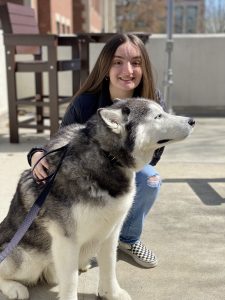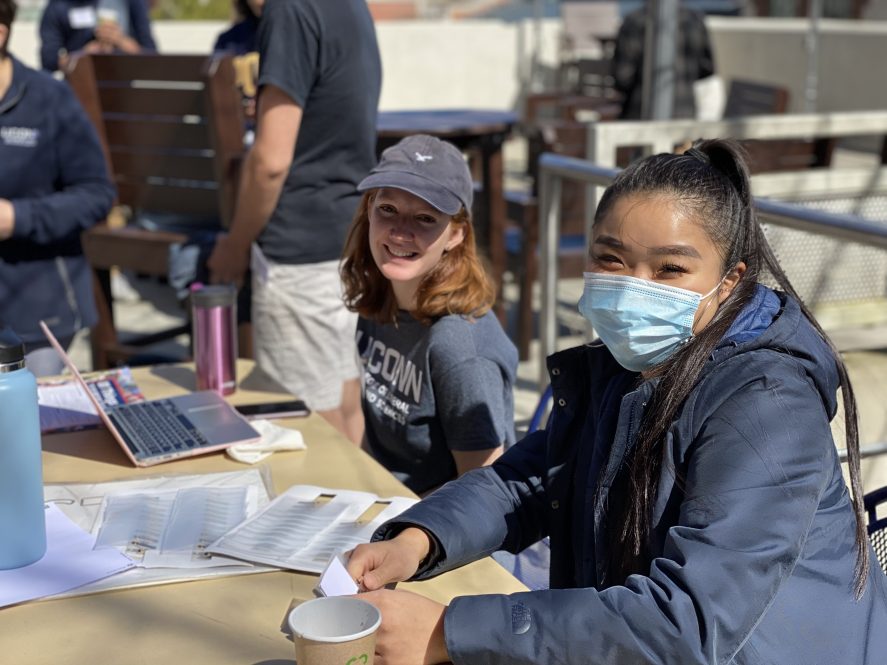If you’re a student at a UConn regional campus, and you transfer to Storrs to finish your major… you know how it goes.
You’ve got all those practical issues to worry about: What courses will you be able to take? Will you be able to keep your grades up in those bigger classes? Where even is the advising office on that enormous campus?
And let’s not forget your social and emotional transition. Will you make friends? Will your new roommate be a slob? What hours will the dining halls be swamped? Will your professors even notice you in that sea of faces?
Transitioning to a new campus is always challenging, says Michael Finiguerra, associate professor-in-residence of ecology and evolutionary biology (EEB) at the Avery Point campus. Time and time again, he says, he sees his EEB undergraduates’ grades falter when they move to Storrs.
“My own extensive experiences at Avery Point reinforce that campus change students struggle with their transition to the Storrs campus,” he says. “So I wanted to create a comprehensive resource program to help regional students successfully transition to Storrs.”
So, with a little help from his friends – namely, students who have successfully made the transition – he’s launched a mentoring program for regional undergraduates transferring to Storrs.
The program is part of his work as a College of Liberal Arts and Sciences (CLAS) Leadership Fellow in the Office of the Dean, which supported the pilot program in the 2021-22 academic year.
“CLAS is the only college where you can spend two full years on a regional campus,” he points out. “We wanted something that would support campus change students before, during and after their transition.”
About 1400 students move from regional campuses to Storrs to finish their degrees each academic year, and many of them experience negative effects from the transition.

Finiguerra did a preliminary analysis on transfer students, which showed that many students suffered a reduction in science course grades upon moving to Storrs. Follow-up surveys showed that the reasons included unfamiliar course formats, like large lectures and the use of teaching assistants; difficulty navigating support systems at the larger campus; and a poor sense of community at Storrs.
What’s more, Finiguerra says, a higher percentage of regional campus attendees are first-generation college students and/or members of underrepresented groups. Many also work to support their education, which could limit their ability to join clubs and programs that would facilitate meeting new friends or participate in experiential learning and research outside the classroom.
So, in fall 2021, Finiguerra applied and was accepted to the CLAS Leadership Fellows program. Based on his experience as a coordinator for the UConn Connects mentoring program, and in partnership with the CLAS Dean’s Office, he developed the UConn Fostering Ideal Regional Student Transitions (FIRST) program.
With his colleague John Redden, associate professor-in-residence of physiology and neurobiology, Finiguerra recruited 15 Storrs students who had transferred from regional campuses as mentors. These mentors were excited to give back to students who had been in their shoes, and helped Finiguerra prioritize what they felt future campus change students should know and experience.
The peer mentors were elated when more than 100 students, from all four regional campuses, signed up.
During the spring 2022 semester, the cohort of peer mentors met with their mentees in small-group sessions. Their marquis event was a day-long field trip to Storrs, where students got to know one another, attended a class in their major, ate in dining halls, and toured campus with their mentors.
Steven Melgar ’24 (CLAS), a molecular and cell biology major who transferred from Avery Point, says the campus tour with mentors was incredibly useful.
“I recognized the buildings as we walked around, and everything started to connect like a constellation,” he says. “The mentors are really nice, and mine occasionally checks in to make sure I’m hanging in there.”
“Every student deserves support and to feel like they belong when they get to campus, no matter what year they are or where they’re coming from,” says mentor Quinn Baron ’23 (CLAS), a psychological sciences major who transferred from the Avery Point campus. “Everything about it, especially our campus tour, has been so rewarding and very special. I felt like I was part of a program that was really making a difference.”
Introduced in 2021, the CLAS Leadership Fellows Program provides mid-career faculty with exposure to academic administration and leadership, mentoring from the Dean and Associate Deans, and support for a project to benefit CLAS faculty and students.
Every student deserves support and to feel like they belong when they get to campus, no matter what year they are or where they’re coming from. — Quinn Baron '23, UConn FIRST mentor
Faculty often don’t have the time or means to create programs like UConn FIRST, nor have they necessarily been trained in programmatic leadership, says Finiguerra. He credits the CLAS Leadership Fellows program with giving him the bandwidth and training to pull off UConn FIRST.
And, like his student mentees, he was exposed to the Storrs campus – and found a community – in ways he’d never had before.
“As a regional in-residence faculty, most of my exposure to CLAS before this was through official communications, visits, and secondhand messages,” he notes. “From our first meeting, I was inspired by the collegial nature of the Fellowship, and how the CLAS leaders encouraged comments and feedback.”
Including Finiguerra, CLAS supported five faculty fellows in the 2021-2022 academic year. The goal of the program, says CLAS Dean Juli Wade, is to provide faculty with exposure to academic administration and leadership, and mentor them through a project in an area of priority for the College.
“This program, which is recruiting its second cohort now, was designed to create a unique opportunity,” Wade says. “In addition to receiving mentorship and gaining insight into College operations, my hope is that the Fellows will reflect on their career aspirations and consider how they might like to advance.”
Other 2021-2022 Leadership Fellow projects are starting to build connections with a tribal university and a historically black college, led by Associate Professor-in-Residence and Director of Women’s, Gender, and Sexuality Studies Sherry Zane ; expanding opportunities for faculty to receive feedback for grant submissions, led by Professor of Physiology and Neurobiology Anastasios Tzingounis; initiatives to support faculty in enhancing teaching and learning experiences across a range of disciplines in the College, led by Associate Professor-in-Residence of Physics Diego Valente; and facilitating the College’s use of data related to faculty research by Associate Professor of Earth Sciences Michael Hren.
Next semester, with support from CLAS, Finiguerra and the UConn FIRST mentors will expand the program by offering a course titled UNIV1820 TYE: Transition Year Experience, to further help regional campus students to help them prepare for their transition.
He hopes student mentees will eventually become mentors and pay back their generosity to other students.
And, he hopes it continues to have the effect that it had on one mentee: “It really made me feel welcomed and not alone.”



